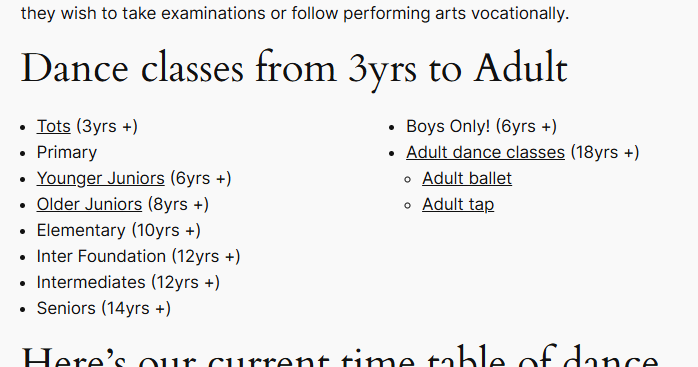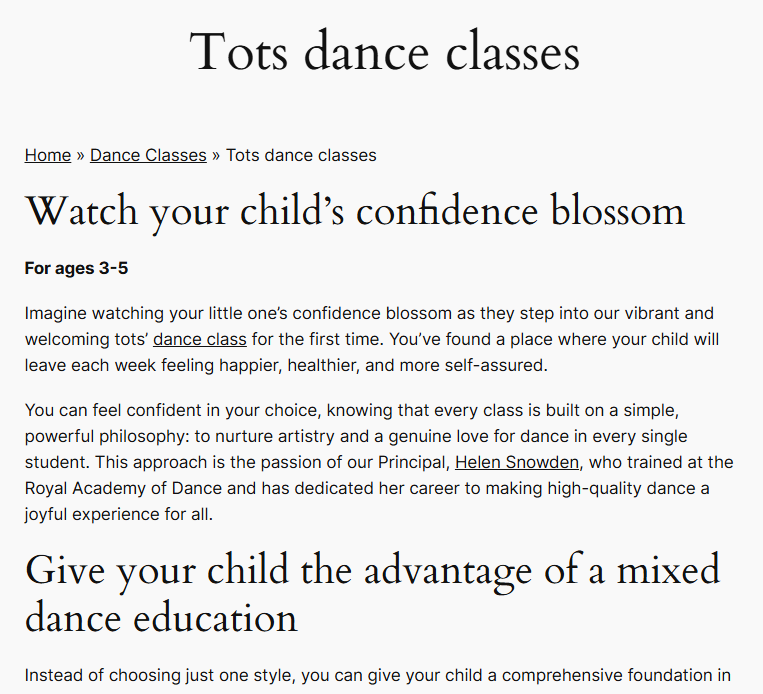You can read a hundred articles about AI search optimisation, but nothing teaches you more than getting your hands dirty. Theory is tidy, but the real world is messy.
So, after weeks of studying the emerging worlds of GEO and LLMO, I decided to run a simple experiment. Could I take a local business website that was being ignored by AI and, with a few small tweaks, get it recommended?
This is the story of how it went.
Experiment candidate
I chose to use the Pennine Academy of Dance website because it serves as a good candidate. Firstly, it is for a local business, and AI seems to be of particular benefit to local searches.
I built the website, so I have deep knowledge of it. Plus, I understand the local market and competitors, as I’ve tracked that data for many years.
Local competitors tend to have quite weak websites – which is understandable. Very few dance schools have the resources to hire or employ digital specialists who can continually work on their websites. This is useful because I’ve not given much love to our dance school website either, beyond refreshing the theme in the past year.
This provided me with as good a set of data to work with as possible.
Finding a problem to test
With the candidate chosen, it was time to find a specific weakness to target. I started by acting like a potential customer and asked Gemini the following question:
“hi gemini can you find me a dance class for a 3year old in huddersfield?”
It returned a list of eight other local dance schools, mentioning them by name and describing their specific classes for 3-year-olds. But not our website.
Bizarrely, one of the recommendations was for another local school’s class which was named “Blackpool”. The AI had likely misinterpreted the class name as a location, adding a layer of contextual confusion to the results.
Obviously, I wasn’t happy with the result. It was time to analyse why AI wasn’t recommending us, create a hypothesis, implement it, and test.
Analysis: why AI didn’t recommend Pennine Academy
Having read all of the websites recommended by Gemini and comparing them to ours, one thing stood out.
The Pennine Academy website mentions it runs classes for people aged 3 years to adult. The class page also includes ages for each class on the timetable. However, I wasn’t sure how easily the AI could understand that context.
I haven’t looked into the code of the timetable plugin, but knowing how the data is inputted in the backend, I suspected the relationship between the class times and the ages wasn’t at all clear.
The penny dropped.
The competitor sites, while simpler, had one massive advantage: clarity. Their class info was written in plain, unambiguous HTML. An AI could understand “Monday, 4:00pm, pre-school class 3+” without any guesswork.
My website, with its data pulled from a backend system, was likely a black box to the AI. The problem wasn’t a lack of information, but a lack of clarity for a non-human reader.
Experiment hypothesis: the plan to appear in AI search
I came up with a two-part hypothesis based on that insight:
- On the classes page: Add a list of all dance class types in plain HTML, including the specific age for each class.
- Create a dedicated page for the ‘Tots’ classes, which are for dancers aged 3+.
The theory was that these two edits would add enough explicit context to help an LLM understand that Pennine Academy has classes in Huddersfield for a 3-year-old.
The output
This is what the new class listing looks like now. The full timetable plugin still exists further down the page:

And here is a screenshot of the new, dedicated Tots dance class page:

The results
It worked.
Within a week of the changes going live, Gemini was recommending Pennine Academy of Dance, slotting it in right where the confusing ‘Blackpool’ class listing used to be. One of my colleagues tested a slightly different phrasing on her account and we were still recommended.
This is the new snippet Gemini wrote:
Pennine Academy of Dance: They have “Tots” classes for ages 3+. These classes offer a mixed dance education, including Ballet, Tap, Acrobatics, and Street Dance, to help children develop versatility and a love for dance. They have classes at Milnsbridge Village Hall and Gledholt Methodist Church.
Interestingly, I asked it in the same chat as the previous question. So it had the context of the previous results and could have easily returned the same list.
The key takeaway?
Sometimes, the most effective optimisation isn’t a complex technical trick. It’s about making your information as simple, structured, and explicitly clear as possible. You have to spell it out for the AI. In this case, a few lines of plain HTML beat a fancy timetable plugin, hands down.